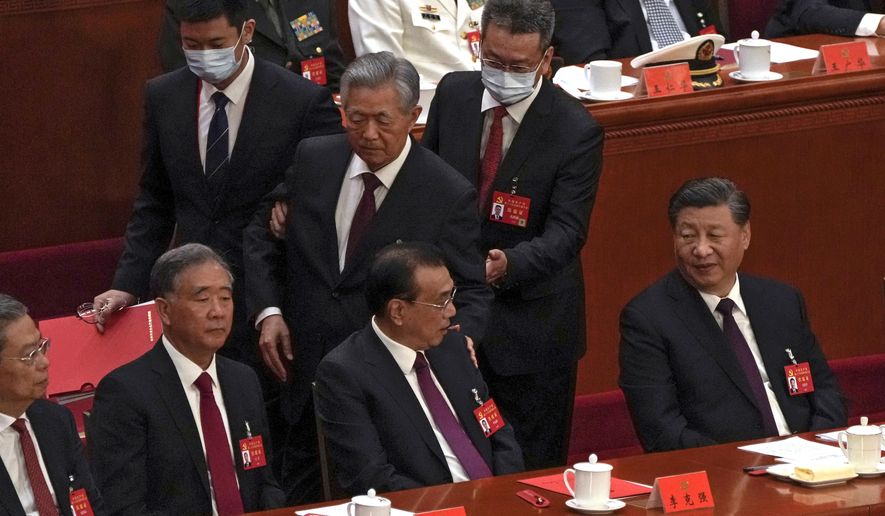Former Chinese President Hu Jintao was escorted out of a major session of the Chinese Communist Party on Saturday in a humiliating display of internal tensions within the ruling communist regime in Beijing.
The dramatic scene played out live on state television where the 79-year-old leader was seated next to current Chinese President Xi Jinping and was then approached by a security guard.
After a short conversation, Mr. Hu was escorted off the stage but not before Mr. Hu was seen attempting to obtain a paper on the dais but was prevented from doing so by Mr. Xi.
With a look of distress on his face, Mr. Hu appeared to resist leaving as he was led away and at one point turned back to try and take his seat.
Mr. Hu also spoke to Mr. Xi and then patted Chinese Premier Li Keqiang, seated to the right of Mr. Xi, on the shoulder.
The leadership drama came shortly before Mr. Xi was to be declared Chinese Communist Party secretary for an unprecedented third term.
Communist Party meetings like the one in Beijing are usually tightly scripted and planning is made years in advance to assure the meetings project an image of unity among leaders.
Chinese propaganda outlets and pro-Beijing trolls on Twitter spread word that the incident was the result of Mr. Hu suffering an illness.
Chinese censors also removed all references to Mr. Hu in Weibo social media posts, Reuters reported from Beijing.
Later Chinese state media coverage of the meeting did not include the expulsion that took place as journalists entered the Great Hall of the People to cover the party meeting.
However, China analysts said the expulsion most likely was the result of Mr. Hu planning to vote against Mr. Xi’s third term and his removal was intended to promote the fiction that Mr. Xi’s consolidation of power was unanimously supported by the party.
Since coming to power in 2012, Mr. Xi has launched a massive campaign of political purges that analysts say was intended to eliminate any rivals for power.
The purge netted thousands of Chinese officials and Party functionaries and was carried out under the guise of countering corruption, an endemic problem in China.
China expert Gordon Chang said Mao Zedong in the past once attempted to compel absolute obedience but in the process nearly destroyed China.
“Will Xi Jinping’s attempt to compel absolute obedience – there is no other explanation for his complete and public humiliation of Hu Jintao, end up ripping the country apart?” he asked on Twitter.
The apparent purge of Mr. Hu came as a surprise.
During his speech opening the 20th Party Congress a week ago, Mr. Xi paid homage to past Chinese leaders and their versions of Marxism-Leninism with Chinese characteristics. That included a reference to Mr. Hu’s variant described in the speech as a “scientific outlook on development.”
Mr. Hu’s life after stepping down from power was not without controversy. In 2016, his chief of staff, Ling Jihua, was sentenced to life in prison on charges of financial corruption.
Mr. Ling’s brother, Ling Wangcheng, is reportedly living in the United States.
The latest party congress ended with amendments to the party constitution designating Mr. Xi as a “core” leaders and making his ideology as having a guiding role for the 95 million party members.
• Bill Gertz can be reached at bgertz@washingtontimes.com.




Please read our comment policy before commenting.